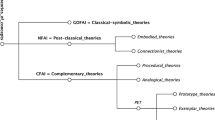Abstract
Formal concept analysis as a methodology of data analysis and knowledge representation has potential to be applied to a variety of linguistic problems. First, linguistic applications often involve the identification and analysis of features, such as phonemes or syntactical or grammatical markers. Formal concept analysis can be used to record and analyze such features. The line diagrams of concept lattices can be used for communication among linguists about such features (see section 2).
Second, modeling and storage of lexical information is becoming increasingly important for natural language processing tasks. This causes a growing need for detailed lexical databases, which should preferably be automatically constructed. Section 3 describes the role that formal concept analysis can play in the automated or semi-automated construction of lexical databases from corpora.
Third, lexical databases usually contain hierarchical components, such as hyponymy or type hierarchies. Because formal concept lattices are a natural representation of hierarchies and classifications, lexical databases can often be represented or analyzed using formal concept analysis. This is described in section 4.
It should be remarked that because this paper appears in a collection volume of papers on formal concept analysis, the underlying notions, such as formal concept, formal object and attribute, and lattice, are not further explained in this paper. The reader is referred to Ganter & Wille (1999) for detailed information on formal concept analysis.
Preview
Unable to display preview. Download preview PDF.
Similar content being viewed by others
References
Apresjan, J.: Regular Polysemy. Linguistics, vol. 142 (1973)
Barwise, J., Seligman, J.: Information Flow. The Logic of Distributed Systems. Cambridge University Press, Cambridge (1997)
Basili, R., Pazienza, M., Vindigni, M.: Corpus-driven unsupervised learning of verb subcategorization frames. AI*IA-97 (1997)
Basili, R., Catizone, R., Padro, L., Pazienza, M.T., Rigau, G., Setzer, A., Webb, N., Zanzotto, F.: Knowledge-Based Multilingual Document Analysis. In: Proceedings of SemaNet 2002 (2002)
Basili, R., Catizone, R., Pazienza, M., Stevenson, M., Velardi, P., Vindigni, M., Wilks, Y.: An empirical approach to Lexical Tuning. In: Proceedings of the Workshop Adapting Lexical and Corpus Resources to Sublanguages and Applications, First International Conference on Language Resources and Evaluation, Granada, Spain (1998)
CYC (2001), http://www.cyc.com
Fellbaum, C.: WordNet: An Electronic Lexical Database and Some of its Applications. MIT Press, Cambridge (1998)
Ganter, B., Wille, R.: Formal Concept Analysis. Mathematical Foundations. Springer, Heidelberg (1999)
Großkopf, A.: Formal concept analysis of verb paradigms in linguistics. In: Diday, Lechevallier & Opitz (eds.) Ordinal and Symbolic Data Analysis (1996)
Großkopf, A., Harras, G.: Begriffliche Erkundung semantischer Strukturen von Sprechaktverben. In: Stumme, Wille (eds.) Begriffliche Wissensverarbeitung: Methoden und Anwendungen (1999)
Janssen, M.: SIMuLLDA. A Multilingual Lexical Database Application using a Structured Interlingua. PhD Thesis, Universiteit Utrecht (2002)
Kipke, U., Wille, R.: Formale Begriffsanalyse erläutert an einem Wortfeld. LDV– Forum, 5 (1987)
Old, L.J.: Synonymy and Word Equivalence. In: Proceedings of the Midwest Artificial Intelligence and Cognitive Science Society Conference (MAICS 1996), Bloomington, IN (1996)
Old, L.J., Priss, U.: Metaphor and Information Flow. In: Proceedings of the 12th Midwest Artificial Intelligence and Cognitive Science Conference, pp. 99-104 (2001)
Osswald, R., Petersen, W.: Induction of Classifications from Linguistic Data. In: Proceedings of the ECAI-Workshop on Advances in Formal Concept Analysis for Knowledge Discovery in Databases (2002)
Petersen, W.: A Set-Theoretical Approach for the Induction of Inheritance Hierarchies. Electronic Notes in Theoretical Computer Science 51 (2001)
Pollard, C., Sag, I.: Head-Driven Phrase Structure Grammar. CSLI Lecture Notes Series, Chicago (1994)
Priss, U.: Classification of Meronymy by Methods of Relational Concept Analysis. In: Proceedings of the, Midwest Artificial Intelligence Conference, Bloomington, Indiana (1996)
Priss, U.: The Formalization of WordNet by Methods of Relational Concept Analysis. In: Fellbaum, Christiane (eds.) WordNet: An Electronic Lexical Database and Some of its Applications, pp. 179–196. MIT press, Cambridge (1998)
Priss, U.: Efficient Implementation of Semantic Relations in Lexical Databases. Computational Intelligence 15(1), 79–87 (1999)
Priss, U.: Associative and Formal Concepts. In: Priss, U., Corbett, D.R., Angelova, G. (eds.) ICCS 2002. LNCS (LNAI), vol. 2393, pp. 354–368. Springer, Heidelberg (2002)
Pustejovsky, J.: The Generative Lexicon. Computational Linguistics 17(4), 409–441 (1991)
Sedelow, S., Sedelow, W.: The Concept concept. In: Proceedings of the Fifth International Conference on Computing and Information, Sudbury, Ontario, Canada, pp. 339–343 (1993)
Sowa, J.: Conceptual Structures: Information Processing in Mind and Machine. Addison-Wesley, Reading (1984)
Sporleder, C.: A Galois Lattice based Approach to Lexical Inheritance Learning. ECAI Workshop on ML and NLP for Ontology Engineering (2002)
Wille, R.: The Formalization of Roget’s International Thesaurus (1993) (unpublished manuscript)
Author information
Authors and Affiliations
Editor information
Editors and Affiliations
Rights and permissions
Copyright information
© 2005 Springer-Verlag Berlin Heidelberg
About this chapter
Cite this chapter
Priss, U. (2005). Linguistic Applications of Formal Concept Analysis. In: Ganter, B., Stumme, G., Wille, R. (eds) Formal Concept Analysis. Lecture Notes in Computer Science(), vol 3626. Springer, Berlin, Heidelberg. https://doi.org/10.1007/11528784_8
Download citation
DOI: https://doi.org/10.1007/11528784_8
Publisher Name: Springer, Berlin, Heidelberg
Print ISBN: 978-3-540-27891-7
Online ISBN: 978-3-540-31881-1
eBook Packages: Computer ScienceComputer Science (R0)




